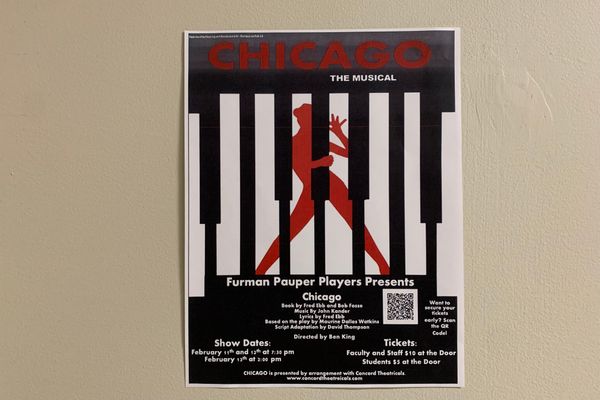It has been tech week for the Pauper Players as they prepare for the opening night of their production of Chicago. The 1975 Broadway hit was originally based on a play written by reporter Maurine Dallas Watkins. For the history buffs out there, Watkins based the play on real court cases she covered for the Chicago Tribune. The story itself is a satire exposing corruption in the criminal justice system and critiquing the idea of the “celebrity criminal.” It was later transformed into a musical by David Thompson, who wrote the script adaptation, Fred Ebb and Bob Fosse, who wrote the lyrics and book, and John Kander, who wrote the music.
Set in Chicago in the Jazz Age, Chicago follows the journey of a chorus girl named Roxie Hart who dreams of being a star. Things get complicated for Hart when Fred Casley, a furniture salesman who "has a friend in music managing," tries to end their affair. Casley had charmed his way into her bed with promises to make her dreams come true, but never followed through. When she finds out that he was simply using her for sex, it does not go over well. The story begins as Roxie Hart is arrested for murder. But he had it coming, right?
There have been several challenges for the Pauper Players’ production, starting with the timeframe. Although the Pauper Players planned on producing Chicago in the fall semester, they could not get the rights to the show until January. Without the rights, director Ben King and stage manager Rebecca Hearn (both seniors) had no book to work from and could not hold auditions or rehearsals. Thus, auditions were pushed back from the usual mid-November timeframe to mid-January, barely a month before the scheduled performance. With McAlister Theater booked, there was no way to push the performance back, leaving the Pauper Players with less than a month to put the show together.
“It's been a very, very quick rehearsal cycle,” music director Keylee Ray ('22) said. The Pauper Players began right away with musical rehearsals conducted by Ray and dance rehearsals conducted by choreographer, Lexi Stone ('22). Actors rehearse from 6 to 10 every night in a staggered system based on what scenes their characters are involved in.
The rehearsal schedule isn’t the only challenge the Pauper Players faced – first they had to assemble the cast and orchestra. With the opera Don Giovanni diverting most vocal majors’ attention, and the Jazz Concert conflicting with opening night, the creative team was hard pressed to find talent in the usual places. A moment of panic, however, created opportunity the incoming freshmen.
Junior vocal performance major, Jenna Justice (who plays Roxie Hart), is co-starred by freshman Mae Mae Collins as Velma. Collins has an impressive background in musical theater and has been described as exceptionally talented regarding her timing and choreography. Stella Peters is another new face to the Pauper Players, debuting as the Hungarian murderess, Hunyak. Peters flaunts her talent with languages as she performs an entire monolog in Hungarian.
While it's great to see talent on stage, the creative team still struggled to find people to audition, especially males. Only one male, freshman Andrew Cooter, auditioned and got the part as Roxie’s devoted husband, Amos. That left Fred Casley and Billy Flynn, the lawyer, to be played by female actors. Ensemble member, Taylor Andrzejewski ('23) agreed to play the male presenting, Fred Casley, but the creative team had a different approach to Flynn’s character. The team decided to introduce this character as a female, a ball-busting BOSS who fights her way to the top
Since the jazz concert conflicted with opening night, Ray had to complete a unique group of musicians who were willing to play outside their comfort instruments. For example, Ray recruited senior oboe performance major, Emma Grace Homoky, to play the alto saxophone, freshman horn player, Hunter Mitten, to play the tuba, and freshman bassoon player Carlyle McDowell to play the tenor saxophone. She even went so far as to recruit the recently graduated Bennet Dean to come back and play trumpet. I can’t wait to hear how this unique spread will sound on opening night!
Another unique aspect to the show – as a traditional performance practice of Chicago, rather than a Pauper Player addition – is that the orchestra is positioned onstage instead of in the pit. Musicians even get to interact with actors throughout the show. While that sounds awesome, Ray said it comes with its own challenges. All that aside, I have no doubt that they will put on a great show!
Opening night is this Friday, February 11th at 7:30 and plays through the 13th. Tickets are on sale now in Trone or online at https://www.eventbrite.com/e/chicago-tickets-240526871347. They are $5 for students, $10 for faculty, and $15 for everyone else. Tickets will also be sold at the door (they accept venmo or cash). I hope to see you there!
